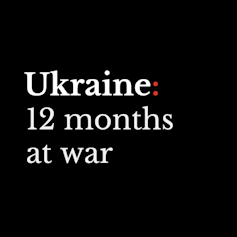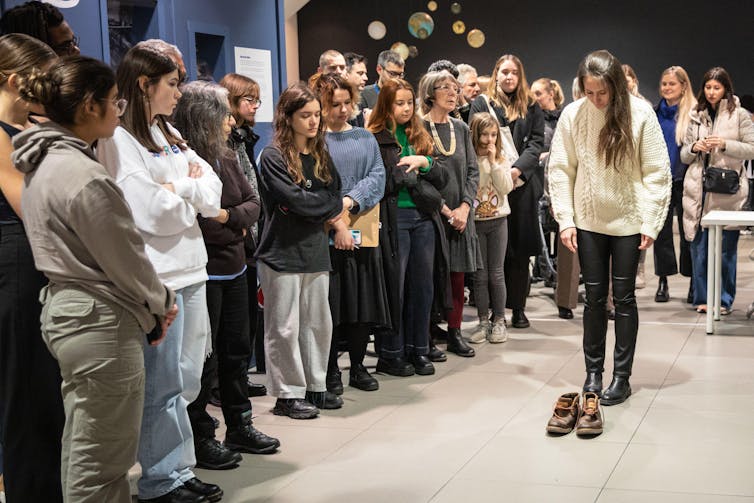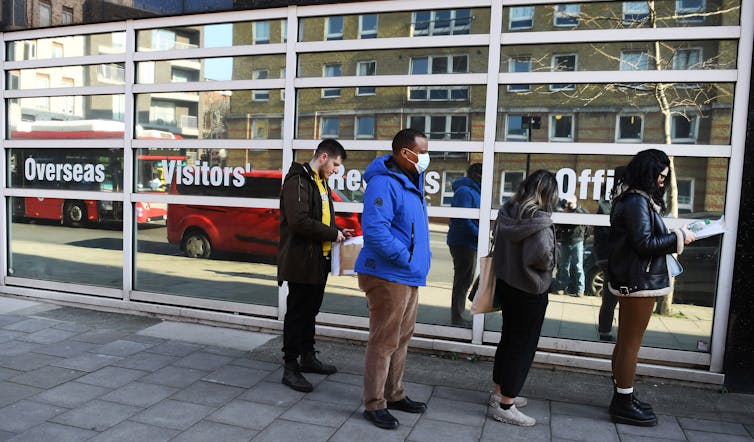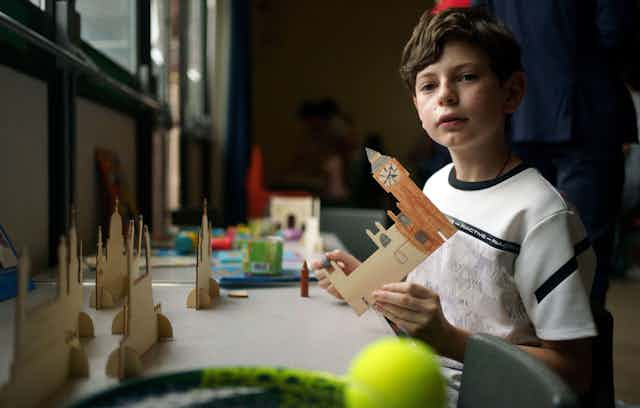Since the Russian invasion of Ukraine in February 2022, more than 8 million Ukrainians have been displaced across Europe. The vast majority – 86% – are women and children.
The most popular destination countries in the UN refugee response plan are Poland with more than 1.5 million refugees and the Czech Republic with 489,865. The latest UN data indicates that there are also more than 1 million Ukrainian refugees in Germany, 169,837 in Italy, 166,832 in Spain and 161,400 in the United Kingdom.
The majority of Ukrainians entering the UK since February 2022 have done so via the two special visa routes. These are the Ukraine family scheme (allowing Ukrainians to join family members already present in the UK) and the Ukraine sponsorship scheme, commonly known as “homes for Ukraine”. Homes for Ukraine allows Ukrainian nationals to come to the UK if they have a sponsor able to provide them with accommodation for at least six months.
As of February 14, the UK government had issued 65,900 Ukraine family scheme visas and 152,600 visas via homes for Ukraine. Visa holders under both schemes have the right to work and study in the UK for up to three years and access to benefits. Homes for Ukraine also offers monthly payments to hosts and refugees.
According to the most recent Office for National Statistics (ONS) surveys with hosts and refugees, the majority of sponsors (74%) are still hosting Ukrainians and most (98%) are hosting the same people in November 2022 as in July 2022.
An increasing number of Ukrainian respondents – from 6% in June 2022 to 19% now – are able to rent their own accommodation. The number of Ukrainian adults reporting that they have found work has also risen significantly – from 19% in June 2022 to 56% now.

Since Vladimir Putin sent his war machine into Ukraine on February 24 2022, The Conversation has called upon some of the leading experts in international security, geopolitics and military tactics to help our readers understand the big issues. You can also subscribe to our weekly recap of expert analysis of the conflict in Ukraine.
But there remain significant challenges for Ukrainians seeking to rebuild their lives in the UK. The ONS survey data shows that 45% of visa holders experience barriers accessing private rented accommodation and 50% report experiencing difficulties taking up work in the UK.
From the point of view of UK hosts, 66% are worried about what will happen to their Ukrainian guests once the sponsorship relationship ends. This is a real concern, given that nearly 3,000 Ukrainian households presented themselves as homeless to local councils at the end of last year.
Experience of Ukrainian refugees
As part of our ongoing research, we have been interviewing Ukrainians in the UK about their experiences of migration, historical memory and political identity. The 14 people we have interviewed to date were from diverse backgrounds and with different experiences of migration.

These in-depth interviews, conducted between September 2022 and February 2023, offer insights into the experience of Ukrainian refugees in the UK beyond the statistics. They tell a story of persistent stereotypes about eastern Europe. Existing research shows that eastern Europe is often presented in the UK as playing “catch up” with the west and this influences the life chances of migrants.
Lack of knowledge about Ukraine
Several of the Ukrainians we spoke to were surprised by how little people in the UK know about Ukrainian history and culture. They reported that British hosts expected the people staying with them to be uneducated, poor and without knowledge of simple things – supermarket “use-by dates”, for example.
These seemingly simple areas of disconnect have caused friction in the relationships between some hosts and their guests. Daryna*, a Ukrainian financier from Kharkov, said:
I was surprised by the attitude of my hosts when I arrived … [they] treated me like a girl who didn’t even finish school … we are perceived as uneducated people … we are not considered as a country that is developed in IT technologies.
Some commented that their hosts seemed not to fully understand the distinction between Ukraine and Russia. Anastasia*, a cook from the Zaporizhzhia region, told us she had been provided with a Russian interpreter when visiting a hospital, who turned out to be a supporter of Putin:
I was very badly affected … she started asking me about us, about our situation, about our war and said that the Americans are to blame that we have a war. She said that the Americans are to blame – not Russia.
From finance to farming
According to the ONS survey data, of those refugees who have found jobs in the UK, 65% were not working in the same sector as they had in Ukraine. Notably many had moved from education and finance into the hospitality, food production, agricultural and farming sectors.
A total of 56% of Ukrainian respondents said their insufficient English language skills had been barriers to finding employment in the UK, while 33% said employers had failed to recognise their Ukrainian qualifications.
Previous research shows that the need to take work for which you are overqualified affects migrants from eastern Europe more than those from western Europe. This is reflected in the experience of several of our interviewees. Daryna* describes the failure to recognise Ukrainians as professionals:
Almost 80% of Ukrainians who came to England are educated, they have diplomas and several diplomas, but currently they only offer cleaning … we’re cheap labour for the English at the moment.
Support that is not just financial
The Department for Levelling Up, Housing and Communities has announced a new support package of more than £650 million for those fleeing the war in Ukraine. The package includes an extension of payments to those hosting Ukrainians through the homes for Ukraine scheme, and funding to help Ukrainian refugees move into their own homes.

This additional support has been enthusiastically welcomed by the Ukrainians we spoke to. As Kateryna*, a manager from the Kherson district, describes it:
My sponsors supported me materially and morally, and that’s how you feel supported in general, on the street, or acquaintances come and show you support.
The detail of their experiences indicates that this financial and moral support should be accompanied by a broader effort to address stereotypes about migrants from eastern Europe.
*All names are pseudonyms.

